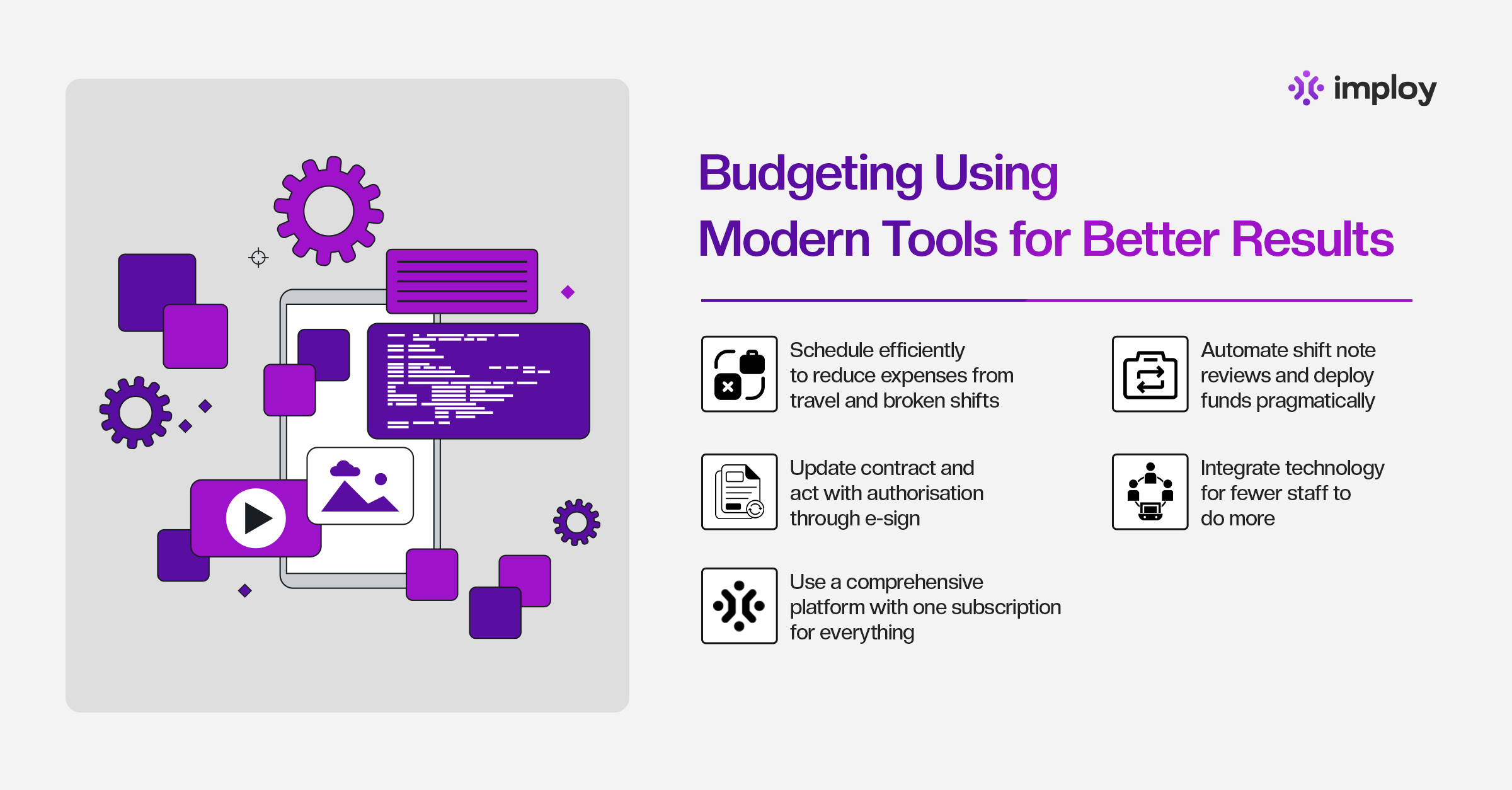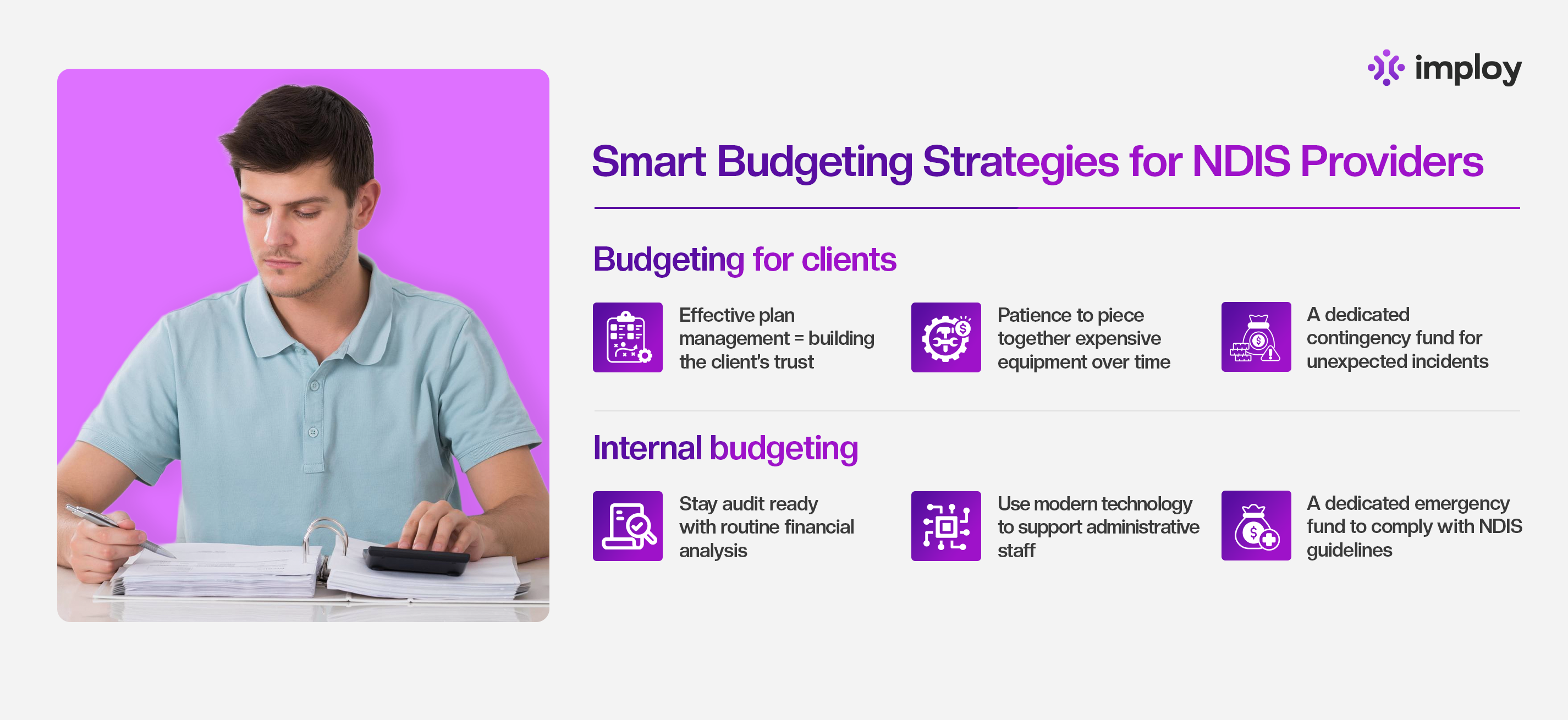Smart Budgeting Strategies for NDIS Providers
Budgeting strategies for NDIS providers, from funding insights to using tools like Imploy for compliance, efficiency, and sustainable growth.

The National Disability Insurance Scheme’s (NDIS) legislation and rules have updated guidelines as of July 2025 for participants and providers. The update explains legislative changes in plan funding, management, and variations. Essentially, participants in the NDIS have three options - self-management, NDIA-managed funding and plan-managed funding. This text aims to optimise the latter.
NDIS providers offering high-quality services are responsible for effective plan management on behalf of their clients. A dedicated team to keep track of invoices, payroll for support workers, and officers to track compliance with the NDIS’s rigorous guidelines are considered essential for plan management. However, their upkeep is an additional cost to the plan.
Providers can subscribe to Imploy Healthcare, a comprehensive software solution that offers invoice management and official documentation in-app, convenient e-sign, and single click billing tethered to every client to reduce this cost. This subscription replaces scattered spreadsheets with a centralised, automated system freeing up personnel to connect with existing and prospective clients.

Providers with effective plan management strategies are invaluable for individuals and their families relying on the NDIS. They arrange support workers, provide capacity building services, and ensure routine care arrives in the form of compassionate trained professionals. No two plans are alike as no two individuals require the same level of support. Therefore, building a flexible plan tailored to the client’s comfort, needs, and functional impairments justifies the cost of hiring NDIS providers over self-management.
The NDIS conducts routine audits on all registered providers. Staying audit ready begins with periodically conducted internal reviews. Training records for all employees and contractors associated with the provider, transparent invoices with figures that align with NDIS’s pricing arrangements, and paperwork on spending that falls below the NDIS’s price limits are under scrutiny. Failing an audit multiple times results in suspension of services, revocation of registration, and severe financial penalties. Audit preparedness is crucial for providers to maintain their reputation as a reliable source of care.
Providers with a proven track record and startling reputations enter into service agreements with more clients. These agreements are binding. Thus, it is in the provider’s best interests to vigilantly monitor their client’s budget and devise a plan for seamless support to meet the client’s needs. This agreement also gives the provider the freedom to assign their service workers to a client based on their preferences. Having access to a dedicated team with members who can provide support efficiently and consistently on a rolling basis through this agreement, in turn, is in the client’s best interests.
Imploy Healthcare is a software built for clients and their support workers to democratize the assignment process. With designated profiles, clients can assign workers to the “do not send” list and vice versa. The AI enhanced scheduling system then removes each from the other’s list of available options. In this sector, technology drives human interaction to foster mutual understanding through compassionate support, and clients can spend years with their NDIS provider without exhausting their options or feeling dissatisfied with the service they receive.
Working with a provider long term allows the participant to build functioning capacity with comfortable company. The client assesses whether the provider is a good fit to realize their long term goals with patient utilisation of their budget. Providers can ambitiously conduct major life improvement upgrades for their clients through the NDIS’s capital support to piece together high-cost equipment over time. With time on hand, the provider earns their client’s trust to build a rehabilitation regime that works, which is one of NDIA’s targets with this scheme.
Participants may exhaust their funds early, a critical necessity may get overlooked, or something as simple as a misplaced invoice may adversely affect a participant’s access to these programs. Thus, it is the NDIS provider’s duty to undertake routine and thorough financial analysis to monitor and document revenue streams, expenses, service performance, and cost to the plan. Even an unexpected visit to the hospital or an unforeseen home modification project can be accommodated when flexibility is built into the budget with the establishment of a proper contingency fund.
Additionally, flexibility for compliance with changing NDIS guidelines requires a dedicated emergency fund. Last updated in July, there were minor revisions to the guidelines in June to the major changes implemented in October of last year. This emergency fund is essential for providers to secure required certification or additional training for support workers.
The NDIS conducts routine audits on all registered providers. Staying audit-ready begins with periodically conducting internal reviews. Training records for all employees and contractors associated with the provider, transparent invoices with figures that align with the NDIS Pricing Arrangements and Price Guide, and paperwork on spending that falls below the NDIS’s price limits are under scrutiny.

Industry-wide, shifts for support workers are upwards of 2 hours. Piecing together multiple shifts with multiple participants throughout the day, support workers are assigned to clients through their care manager. There are travel allowances as well as broken shift accommodation to account for while calculating the support workers time with their clients. These accommodations add to the provider’s expenses. When clients receive care at home, there can be multiple instances where the individual providing support is required to stay beyond their contracted hours for the day. Care managers are responsible for adjusting to these factors on the fly.
The AI in Imploy Healthcare powers a scheduling algorithm. The system matches service worker to participant and recommends adjustments to the schedule by calculating distance travelled between shifts, checking availability based on the number of hours logged for the week, the service worker’s personal travel time, and familiarity between participant and service worker. The details of every appointment are communicated and approved by the participant, service worker, and care manager in real time while the app suggests the best candidate to occupy a vacant shift via a numerical rating. NDIS providers using Imploy Healthcare report a single care manager can now direct a bigger team of service workers to participants consistently. Service workers report shorter travel distances and wait times in-between shifts. This is made possible through the app’s in-built features.
Savings compound throughout the course of the year. Gathering freed up funds from not spending on the avoidable is a strategic choice reflecting proper plan management during the NDIA’s annual review. Implementing smarter budgeting strategies and securing a reputation for proper plan management in professional circles is key for providers in attracting clients. Using modern tools and software built for providers does not necessarily improve the quality of service provided to participants, but does increase the efficiency of the attempt.
Providers can subscribe to Imploy Healthcare… freeing up personnel to connect with existing and prospective clients. Many still face challenges with common NDIS invoicing mistakes, which can derail compliance and budgeting efforts if not addressed early."
Because smarter budgeting accounts for more than balanced books – it builds a resilient, high-performing organisation that delivers meaningful outcomes for its clients. By chopping off the excess, NDIS providers can focus on delivering quality care without a bloated administrative load through strategy and technological adoption. A tool like Imploy Healthcare is built for NDIS providers to stay efficient, audit-ready, and financially healthy with just one comprehensive subscription.
FAQ
Q1: How does Imploy Healthcare contribute to smarter budgeting for providers?
By centralising financial data and automating invoicing, providers can track revenue, expenses, and contingencies more accurately. Savings from reduced administrative overhead and optimized scheduling can be reinvested into participant care or emergency funds, strengthening financial resilience.
Q2: Can participants influence which support workers are assigned to them?
Yes. Imploy Healthcare allows participants to assign “do not send” preferences for support workers, while the AI scheduling system ensures these preferences are respected. This fosters trust and long-term relationships between participants and providers.
Q3: Does Imploy Healthcare support compliance with the latest NDIS guidelines?
Absolutely. The software keeps providers up-to-date with the latest legislative changes, pricing arrangements, and audit requirements. Providers can manage emergency funds, training, and certification to stay compliant with NDIS updates, including the July 2025 revisions.
Q4: Is Imploy Healthcare suitable for providers of all sizes?
Yes. Whether you are a small NDIS provider or a larger organisation, Imploy Healthcare scales with your team. It allows a single care manager to efficiently coordinate multiple support workers and clients, improving service delivery and operational efficiency.
Q5: How does Imploy Healthcare enhance participant outcomes?
By freeing staff from administrative tasks, providers can focus on quality, personalised care. The software also ensures budgets are managed effectively, support workers are assigned thoughtfully, and participants’ goals are met, improving long-term satisfaction and capacity-building outcomes.
Q6: Can Imploy Healthcare help providers stay audit-ready?
Yes. Imploy Healthcare helps maintain training records, transparent invoices aligned with NDIS pricing, and budget tracking, making internal reviews and audits simpler. Providers can easily demonstrate compliance, reducing the risk of suspension or financial penalties.


.jpeg)



